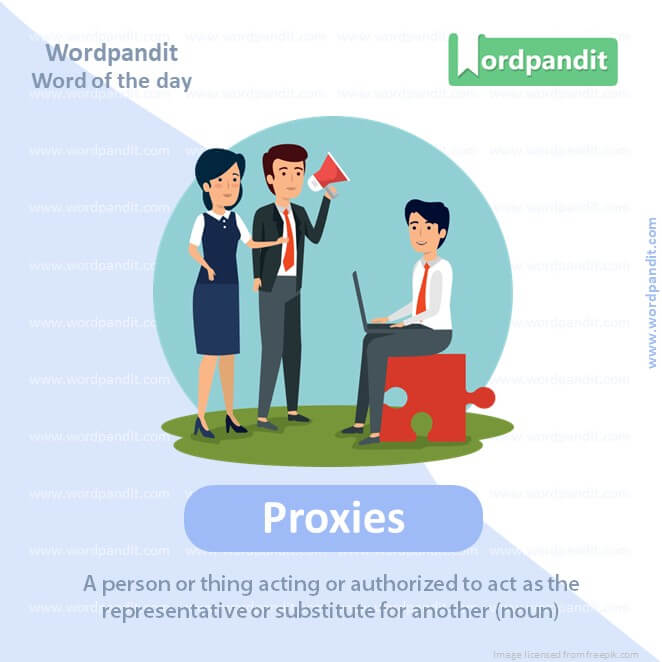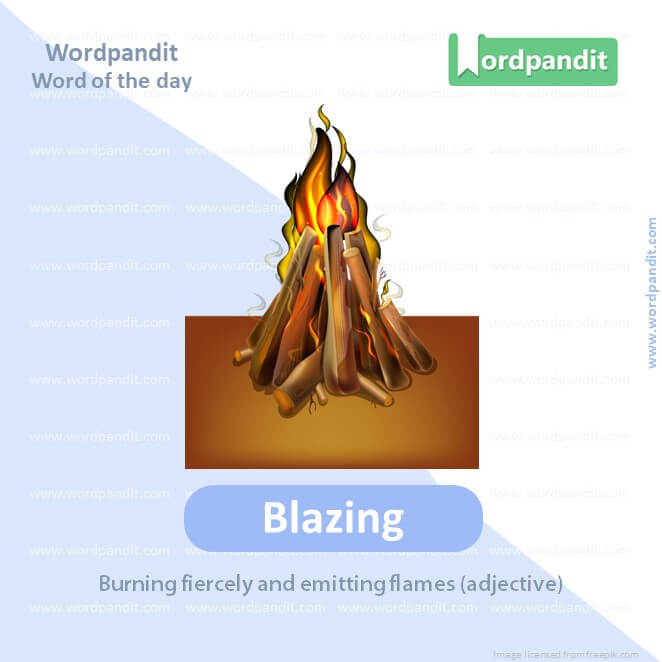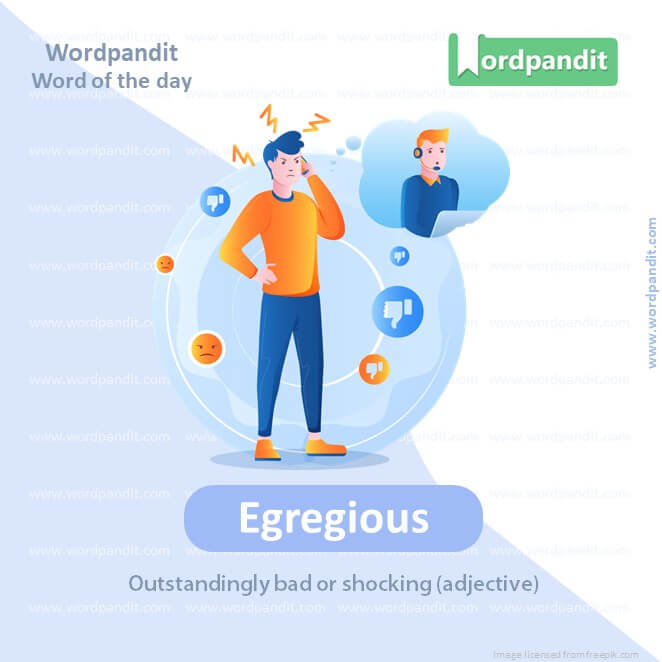Daily Vocabulary Words: List of Daily Used Words in Leading International Newspapers
Hi there. Welcome to this special section @ Wordpandit.
Our endeavour here is very simple: to highlight important daily vocabulary words, which you would come across in leading newspapers in the country. We have included the following newspapers in our selection:
• The New York Times
• The Washington Post
• Scientific American
• BBC
• The Guardian
• Psychology Today
• Wall Street Journal
• The Economist
We are putting in extensive work for developing your vocabulary. All you have got to do is be regular with this section and check out this post on a daily basis. This is your repository of words that are commonly used and essentially, we are posting a list of daily used words. Hence, this has significant practical application as it teaches you words that are used commonly in leading publications mentioned above.
Visit the website daily to learn words from leading international newspapers.

WORD-1: Proxies
CONTEXT: The deep and lasting human consequences of Israel’s terrifying, perpetual war on Palestinians – prosecuted with indiscriminate cruelty by an occupying army and its de facto proxies, fanatical settler militias – have been plain for anyone willing or inclined to see, for generations.
SOURCE: Al Jazeera
EXPLANATORY PARAGRAPH: Proxies are like stand-ins or substitutes that do something in place of something else. Imagine you can’t go to your friend’s birthday party, but you send your brother instead to give your friend the gift you bought. Your brother is acting like a proxy, helping you do something when you can’t do it yourself.
MEANING: A person or thing acting or authorized to act as the representative or substitute for another (noun).
PRONUNCIATION: PROK-seez
SYNONYMS: substitutes, replacements, delegates, agents, surrogates, stand-ins, representatives
USAGE EXAMPLES:
1. She votes at the meetings through proxies.
2. The prince often uses proxies to attend events when he’s unable to.
3. My lawyer acts as my proxy when I’m abroad.
4. Internet users sometimes utilize proxies to browse anonymously.

WORD-2: Blazing
CONTEXT: Implicit in those dense, meticulously chronicled studies was what amounted to a blazing flare intended to seize finally the flighty attention of complicit Western governments and media.
SOURCE: Al Jazeera
EXPLANATORY PARAGRAPH: Blazing means something is burning very brightly and powerfully. Imagine a big campfire with tall, strong flames that light up everything around it and make you feel warm when you stand near it. That’s what we call blazing!
MEANING: Burning fiercely and emitting flames (adjective).
PRONUNCIATION: BLAY-zing
SYNONYMS: flaming, fiery, ablaze, burning, glowing, scorching, aflame
USAGE EXAMPLES:
1. The blazing sun made it difficult to walk outside.
2. We warmed our hands by the blazing fire.
3. The car was blazing after the accident.
4. The blazing torches illuminated the dark night.
WORD-3: Flare
CONTEXT: Implicit in those dense, meticulously chronicled studies was what amounted to a blazing flare intended to seize finally the flighty attention of complicit Western governments and media.
SOURCE: Al Jazeera
EXPLANATORY PARAGRAPH: Flare can be something bright that suddenly lights up or gets bigger. Imagine if you take a small flame and then whoosh! It quickly gets bigger and lights up a dark room. That’s like a flare. Sometimes, people use a special kind of light called a flare in emergencies to show where they are.
MEANING: A sudden brief burst of bright flame or light (noun).
PRONUNCIATION: FLAIR
SYNONYMS: flash, burst, blaze, gleam, flicker, glare, sparkle
USAGE EXAMPLES:
1. The flare lit up the night sky.
2. The pilot sent up a flare to signal for help.
3. Her anger was a flare, sudden and intense.
4. A flare of lightning illuminated the dark forest.

WORD-4: Vengeance
CONTEXT: Ultimately, violence begets violence in round after round of horrific vengeance by both sides.
SOURCE: Al Jazeera
EXPLANATORY PARAGRAPH: Vengeance is when you want to hurt someone because they hurt you or did something bad to you. It’s like if someone takes your toy, and you want to take their toy to make it fair in your mind. But remember, vengeance or wanting to get back at someone is not a nice feeling and it’s always better to talk and sort things out instead!
MEANING: The act of doing something hurtful to someone because they did something hurtful to you (noun).
PRONUNCIATION: VEN-juhnss
SYNONYMS: retribution, retaliation, payback, revenge, comeuppance, reprisal, avengement
USAGE EXAMPLES:
1. She sought vengeance for the injustice done to her.
2. The warrior swore vengeance on his enemies.
3. The film is a tale of vengeance and redemption.
4. His vengeance knew no bounds after the betrayal.

WORD-5: Eager
CONTEXT: It may be that people don’t want to reopen memories of that painful time. And Rishi Sunak, the prime minister, seems eager to bury this story.
SOURCE: The Guardian
EXPLANATORY PARAGRAPH: Eager means you are really, really excited and can’t wait for something to happen! Imagine waiting for your birthday party, and you’re so excited to see your friends, eat cake, and open presents. That feeling of really looking forward to it is being eager!
MEANING: Really wanting to do or have something, being enthusiastic and excited (adjective).
PRONUNCIATION: EE-gur
SYNONYMS: keen, anxious, enthusiastic, ardent, excited, willing, impatient
USAGE EXAMPLES:
1. She was eager to open her birthday presents.
2. The students are eager for the summer vacation.
3. He was eager to learn and asked many questions.
4. The team was eager to win the championship.

WORD-6: Egregious
CONTEXT: He said: “The failure of government to tackle fraud felt so egregious, and the need for remedy so urgent, that I felt my only option left was to smash some crockery to get people to take notice.”
SOURCE: The Guardian
EXPLANATORY PARAGRAPH: “Egregious” is a word we use when something is really, really bad, but not in a scary way. Imagine if someone took all the cookies from the cookie jar and left none for anyone else. That would be an egregious thing to do because it’s not fair and way too much!
MEANING: Outstandingly bad or shocking (adjective).
PRONUNCIATION: eh-GREE-jus
SYNONYMS: shocking, appalling, terrible, awful, horrendous, flagrant, glaring
USAGE EXAMPLES:
1. It was an egregious error by the referee.
2. She was shocked by his egregious behavior at the party.
3. The company made an egregious mistake in their advertisement.
4. It’s egregious to ignore someone who is talking to you.
WORD-7: Clawing
CONTEXT: Clawing this back seems an obvious step to take, especially given the shortfalls in funding for the NHS and for the state education sector.
SOURCE: The Guardian
EXPLANATORY PARAGRAPH: “Clawing” means using your nails, like how cats or dogs do with their paws, to scratch or grab something. Imagine a cat climbing a tree using its sharp claws to hold on and move up. That action the cat is doing is called clawing.
MEANING: Scratching or tearing at with the nails or claws (verb).
PRONUNCIATION: KLAW-ing
SYNONYMS: scratching, scraping, tearing, digging, grappling, lacerating, gouging
USAGE EXAMPLES:
1. The kitten was clawing at the yarn ball.
2. He felt like his fears were clawing at his mind.
3. The bird was clawing the bark to find insects.
4. She was clawing her way through the dense forest.
WORD-8: Decrepit
CONTEXT: And well into the 1990s a rail journey involved an old, decrepit and congested train
SOURCE: The Guardian
EXPLANATORY PARAGRAPH: “Decrepit” is a word we use to describe something that’s old and not in good shape anymore, like a really old, broken-down car that can’t drive anymore or an old toy that’s falling apart. It means it has seen better days and is worn out.
MEANING: Worn out or ruined because of age or neglect (adjective).
PRONUNCIATION: deh-KREP-it
SYNONYMS: dilapidated, run-down, tattered, worn-out, old, battered, rickety
USAGE EXAMPLES:
1. The decrepit building was about to collapse.
2. His favorite, decrepit teddy bear was always by his side.
3. They renovated the decrepit old mansion.
4. The town had many decrepit structures that needed attention.
WORD-9: Cathedral
CONTEXT: Take León, a northern city of 120,000 people, with an ageing population, a declining post-industrial economy and a renowned Gothic cathedral.
SOURCE: The Guardian
EXPLANATORY PARAGRAPH: A cathedral is a very big and special church, usually the main church in a city. It’s like the big castle where the main leader of the church in that area stays. People go there to pray, and sometimes these cathedrals are very old and have beautiful artwork inside.
MEANING: A large and important church, typically one that is the seat of a bishop in a particular Christian denomination (noun).
PRONUNCIATION: kuh-THEE-drul
SYNONYMS: church, basilica, minster, sanctuary, temple, chapel, abbey
USAGE EXAMPLES:
1. The cathedral in our city is over 300 years old.
2. Many tourists visit the famous cathedral for its stained glass windows.
3. They got married in the grand cathedral downtown.
4. Every Christmas, a special service is held at the cathedral.
WORD-10: Endowed
CONTEXT: “Colonialism is not a thinking machine, nor a body endowed with reasoning faculties. It is violence in its natural state, and it will only yield when confronted with greater violence.”
SOURCE: Al Jazeera
EXPLANATORY PARAGRAPH: “Endowed” means to be given a special gift or quality. Imagine if you had a magical fairy who gave you the power to sing beautifully; you would be endowed with a great singing voice. It’s like being given a special present that’s a part of you.
MEANING: Provided with a quality, ability, or asset (verb).
PRONUNCIATION: en-DOWD
SYNONYMS: gifted, granted, blessed, furnished, supplied, equipped, provided
USAGE EXAMPLES:
1. She was endowed with a natural talent for music.
2. The school was endowed by a generous benefactor.
3. The forest is endowed with a wide variety of species.
4. The artist was endowed with great imagination and creativity.
Vocabulary Words for IELTS'
Preparing for an esteemed examination like IELTS urges a diligent focus on ‘vocabulary words for IELTS’. These specific words, frequently prominent in IELTS examinations, play a vital role in expressing ideas effectively and articulately. To successfully conquer ‘vocabulary words for IELTS’, a strategic and focused approach is quintessential.
A fundamental step when learning ‘vocabulary words for IELTS’ is understanding these words in the context of use. For this, exposure to diverse resources like newspapers, journals, academic texts, and digital content is crucial. This engagement aids in understanding the nuances of these words, fortifying your preparation for ‘vocabulary words for IELTS’.
When tackling ‘vocabulary words for IELTS’, regular practice is the cornerstone of success. Consistent writing and speaking exercises help in embedding this vocabulary in your linguistic repertoire. Take situations or topics that commonly appear in the IELTS exam and practice crafting complex yet coherent sentences using these words.
In the journey to unfold ‘vocabulary words for IELTS’, making use of memory-enhancement techniques can orchestrate your success. Tools like flashcards and recall-based applications can significantly assist in retaining and reinforcing these words in your memory. Additionally, forming personal connections or stories with these words can greatly improve word recall.
Brevity is equally significant when preparing for ‘vocabulary words for IELTS’. Attempt to learn a limited number of words each day rather than tackling a large list all at once. This habit allows the brain adequate time to absorb and store these words securely, ensuring an effective learning experience.
In conclusion, the quest to master ‘vocabulary words for IELTS’ is an engaging dance of comprehension, practice, memory techniques, and thoughtful pacing. As you pirouette gracefully through these strategies, you’ll find communicating your IELTS responses with the right ‘vocabulary words for IELTS’ is less of a cliffhanger and more of an epic tale of language success.











